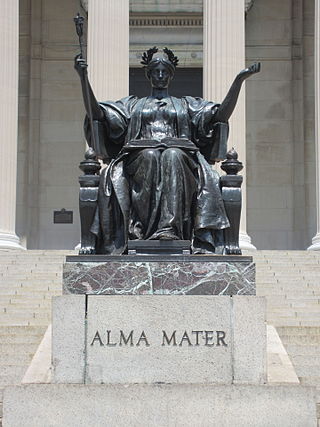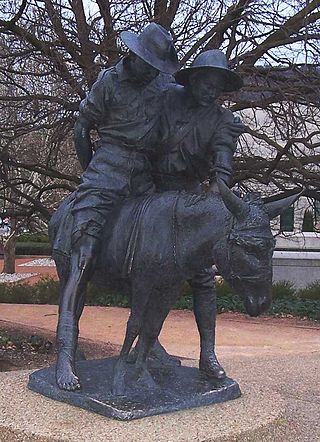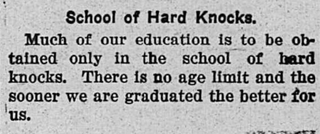New Zealand English (NZE) is the variant of the English language spoken and written by most English-speaking New Zealanders. Its language code in ISO and Internet standards is en-NZ. It is the first language of the majority of the population.
Cunt is a vulgar word for the vulva. It is used in a variety of ways, including as a term of disparagement. "Cunt" is often used as a disparaging and obscene term for a woman in the United States, an unpleasant or objectionable man or woman in the United Kingdom and Ireland, or a contemptible man in Australia and New Zealand. In Australia and New Zealand, it can also be a neutral or positive term when used with a positive qualifier. The term has various derivative senses, including adjective and verb uses.
Eh is a spoken interjection used in many varieties of English. The oldest Oxford English Dictionary defines eh as an "interjectional interrogative particle often inviting assent to the sentiment expressed." Today, while eh has many different uses, it is most popularly used in a manner similar in meaning to "Excuse me?", "Please repeat that", "Huh?", or to otherwise mark a question. It is also commonly used as an alternative to the question tag "right?", as a method for inciting a reply, as in "Don't you think?", "You agree with me, right?", as in, "It's nice here, eh?". In the Americas, it is most commonly associated with Canada and Canadian English, though it is also common in England, Scotland, and New Zealand. It is also known in some American regions bordering Canada, including the area stretching from northern Wisconsin up to Michigan's Upper Peninsula. Similar interjections exist in many other languages, such as Azerbaijani and Italian.

Alma mater is an allegorical Latin phrase used to proclaim a school that a person has attended or, more usually, from which one has graduated. Alma mater is also a honorific title for various mother goddesses, especially Ceres or Cybele. Later, in Catholicism, it became a title of Mary, mother of Jesus.

The Crown broadly represents the state in all its aspects within the jurisprudence of the Commonwealth realms and their subdivisions. The term can be used to refer to the office of the monarch or the monarchy as institutions; to the rule of law; or to the functions of executive, legislative, and judicial governance and the civil service.
This glossary of names for the British include nicknames and terms, including affectionate ones, neutral ones, and derogatory ones to describe British people, Irish People and more specifically English, Welsh, Scottish and Northern Irish people. Many of these terms may vary between offensive, derogatory, neutral and affectionate depending on a complex combination of tone, facial expression, context, usage, speaker and shared past history.

"Kiwi" is a common self-reference used by New Zealanders, though it is also used internationally. Unlike many demographic labels, its usage is not considered offensive; rather, it is generally viewed as a symbol of pride and affection for most people of New Zealand.
Bugger or buggar can at times be considered as a mild swear word. In the United Kingdom the term has been used commonly to imply dissatisfaction, refer to someone or something whose behaviour is in some way inconvenient or perhaps as an expression of surprise. In the United States, particularly in the Midwest and South, it is an inoffensive slang term meaning "small animal".

A writ of election is a writ issued ordering the holding of an election. In Commonwealth countries writs are the usual mechanism by which general elections are called and are issued by the head of state or their representative. In the United States, writs are more commonly used to call special elections for political offices.
Australian English is a major variety of the English language spoken throughout Australia. Most of the vocabulary of Australian English is shared with British English, though there are notable differences. The vocabulary of Australia is drawn from many sources, including various dialects of British English as well as Gaelic languages, some Indigenous Australian languages, and Polynesian languages.

Mateship is an Australian cultural idiom that embodies equality, loyalty and friendship. Russel Ward, in The Australian Legend (1958), once saw the concept as central to the Australian people. Mateship derives from mate, meaning friend, commonly used in Australia as an amicable form of address.

"The bush" is a term mostly used in the English vernacular of Australia and New Zealand where it is largely synonymous with hinterland or backwoods respectively, referring to a natural undeveloped area. The fauna and flora contained within this area may be mostly indigenous to the region, although exotic species will often also be present.
"Break a leg" is a typical English idiom used in the context of theatre or other performing arts to wish a performer "good luck". An ironic or non-literal saying of uncertain origin, "break a leg" is commonly said to actors and musicians before they go on stage to perform or before an audition. Though the term likely originates in German, the English expression is first attributed in the 1930s or possibly 1920s, originally documented without specifically theatrical associations. Among professional dancers, the traditional saying is not "break a leg", but the French word merde.

A pen is an enclosure for holding livestock. It may also perhaps be used as a term for an enclosure for other animals such as pets that are unwanted inside the house. The term describes types of enclosures that may confine one or many animals. Construction and terminology vary depending on the region of the world, purpose, animal species to be confined, local materials used and tradition. Pen or penning as a verb refers to the act of confining animals in an enclosure.
Digger slang, also known as ANZAC slang or Australian military slang, is Australian English slang as employed by the various Australian armed forces throughout the 20th and 21st centuries. There have been four major sources of the slang: the First World War, the Second World War, the Korean War and the Vietnam War. The name Digger slang derives from the cultural stereotype of the Digger in the First World War. Graham Seal AM, Professor of Folklore at Curtin University of Technology, calls the slang Diggerese. It is a combination of an occupational jargon and an in-group argot.

No worries is an expression seen in English meaning "do not worry about that", "that's all right", "forget about it" or "sure thing". It is similar to the American English "no problem". The phrase is widely used in Australian and New Zealand speech and represents a feeling of friendliness, good humour, optimism and "mateship" in Australian culture. The phrase has been referred to as the national motto of Australia.
"As easy as pie" is a popular colloquial idiom and simile which is used to describe a task or experience as pleasurable and simple. The phrase is often interchanged with piece of cake, which shares the same connotation.

The School of Hard Knocks is an idiomatic phrase meaning the education one gets from life's usually negative experiences, often contrasted with formal education. The term originated in the United States; its earliest documented use was in 1870 in the book The Men Who Advertise:
"... his misfortunes were largely owing to the inexperience of youth. Trained, however, in the school of hard knocks, he now had learned the theory of success".

Woke is an adjective derived from African-American Vernacular English (AAVE) originally meaning alertness to racial prejudice and discrimination. Beginning in the 2010s, it came to encompass a broader awareness of social inequalities such as racial injustice, sexism, and denial of LGBT rights. Woke has also been used as shorthand for some ideas of the American Left involving identity politics and social justice, such as white privilege and reparations for slavery in the United States.










